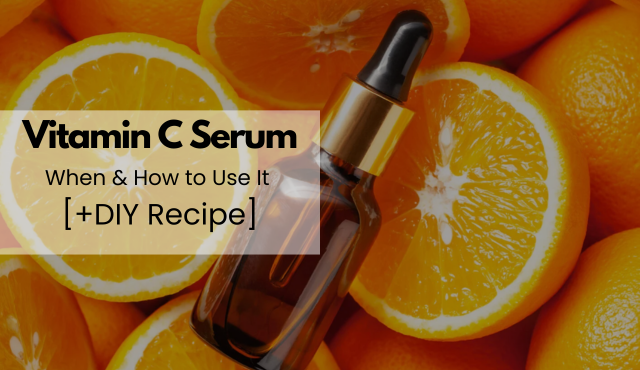DIY Vitamin C Serum: A Comprehensive Guide for Radiant Skin
Unlock youthful skin with our DIY Vitamin C serum guide. Learn how to make your own effective anti-aging serum at home!

- Seo Yuna
- 4 min read

DIY Vitamin C Serum: Your Guide to Radiant, Youthful Skin | cosmi.skin
Vitamin C is a powerhouse ingredient in skincare, renowned for its ability to boost collagen production, brighten the skin, and fight signs of aging. While many effective Vitamin C serums are available, they can be expensive. This guide provides a comprehensive explanation of how to create your own potent Vitamin C serum at home, offering a cost-effective solution for achieving radiant skin. | cosmi.skin
Why Vitamin C? The Science Behind the Glow
As we age, our skin’s collagen production naturally declines, leading to wrinkles, fine lines, and a loss of elasticity. Vitamin C, particularly L-Ascorbic Acid (LAA), is a potent topical treatment that stimulates collagen synthesis, effectively combating these visible signs of aging. While cosmetic companies have worked to stabilize Vitamin C in their products, these formulations often come with a hefty price tag. | cosmi.skin
L-Ascorbic Acid (LAA): The Gold Standard
While other Vitamin C derivatives exist (SAP, MAP), LAA is widely considered the most effective for topical application. It’s readily available and easily mixed with a base to create your own serum. | cosmi.skin
The Basic DIY Vitamin C Serum Recipe
This simple recipe combines LAA powder with distilled water and glycerin. Glycerin acts as a moisturizer and thickens the serum, making it easier to apply.
Ingredients:
- L-Ascorbic Acid (LAA) powder (finely ground is recommended)
- Distilled water
- Glycerin
Instructions:
- Dissolve the LAA: Completely dissolve the LAA powder in distilled water before adding glycerin. LAA is not soluble in glycerin. | cosmi.skin
- Add Glycerin: Incorporate glycerin to your preferred consistency. Start with a small amount and adjust to avoid a sticky feeling. A ratio of 8:1 (water to glycerin) is a good starting point.
Important Considerations: Percentages and Gradual Introduction
Vitamin C can be irritating, so gradually introduce it into your skincare routine to allow your skin to adjust.
- Start Low: Begin with a 5% concentration for two weeks. If any irritation occurs, reduce the concentration further.
- Increase Gradually: If no irritation occurs after two weeks, increase to 10%, then 15%, and finally 20%, allowing two weeks at each concentration. | cosmi.skin
- Maximum Effectiveness: 10-20% is considered an effective range for collagen production. Do not exceed 20%, as it can lead to negative effects.
Example Recipes (Using minimal glycerin, adjust to preference):
5% Serum:
- Dissolve 1/2 tsp LAA in 8 1/2 tsp distilled water
- Add 1 tsp glycerin once fully dissolved | cosmi.skin
10% Serum:
- Dissolve 1 tsp LAA in 8 tsp distilled water
- Add 1 tsp glycerin once fully dissolved
15% Serum:
- Dissolve 1.5 tsp LAA in 7 1/2 tsp distilled water
- Add 1 tsp glycerin once fully dissolved | cosmi.skin
20% Serum:
- Dissolve 2 tsp LAA in 7 tsp distilled water
- Add 1 tsp glycerin once fully dissolved
Storage and Application
Vitamin C is unstable and degrades when exposed to light and air. Proper storage is crucial to maintain its effectiveness.
- Dark Glass Bottle: Store your serum in a dark-colored, air-tight glass bottle (spray or dropper).
- Sunlight Protection: Keep the bottle in a dark cabinet away from sunlight.
- Fresh Batches: Mixing a fresh batch weekly is recommended, although some users find bi-weekly mixing sufficient. | cosmi.skin
Application:
- Shake well before each use.
- Apply to the face and body (optional). | cosmi.skin
- Allow to dry completely before applying other products.
- Follow with a moisturizer and sunscreen.
The Importance of pH Level
The pH level of your Vitamin C serum is crucial for optimal absorption and effectiveness. A pH between 3.0 and 3.5 is ideal.
- Testing: Use pH strips to test the pH of your serum.
- Adjusting: Add baking soda to increase the pH if it’s too low. | cosmi.skin
Sunscreen is Non-Negotiable
Vitamin C increases your skin’s sensitivity to the sun. Daily sunscreen use (SPF 30 or higher) is essential to protect your skin from sun damage.
Patience is Key
It takes time to see the benefits of Vitamin C serum. Consistent, daily use for at least 3-6 months is necessary to stimulate collagen production and improve skin appearance.
Resources
- Finely Ground LAA Powder
- Glycerin and Distilled Water (available at any drugstore)
- Dark Glass Spray Bottle
- Dark Glass Dropper Bottle
Considerations and Customizations from Discussions
- Sensitivity: If your skin is too sensitive to reach a 20% concentration, even 10% can provide collagen-boosting benefits. | cosmi.skin
- Adding Vitamin E: Some individuals consider incorporating vitamin E to extend the shelf life of the serum.
- Witch Hazel: As suggested in comments, witch hazel is a good alternative to water, but ensure it is alcohol-free to avoid irritation. | cosmi.skin
Final Thoughts
DIY Vitamin C serum offers a cost-effective and customizable way to harness the power of this incredible ingredient. With a little patience and attention to detail, you can create a potent serum that promotes collagen production, brightens your complexion, and helps you achieve radiant, youthful skin. | cosmi.skin
Unlock Your Healthiest Skin – Backed by Science and Personalization
Cosmi is your personal AI cosmetologist — offering tailored skincare recommendations and expert advice based on your unique skin type, concerns, and goals.
Visit Cosmi